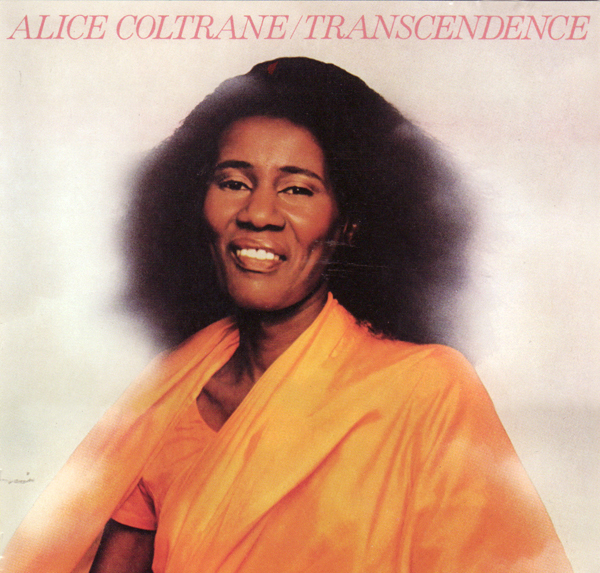ALICE COLTRANE


1/ Radhe-Shyam (Coltrane) 7.22
2/ Vrindavana Sanchara (Coltrane) 4.03
3/ Transcendence (Coltrane) 5.56
4/ Sivaya (Traditional) 4.48
5/ Ghana Nila (Traditional) 6.26
6/ Bhaja Govindam (Traditional) 4.33
7/ Sri Nrsimha (Traditional) 4.55
Tracks 1-3 recorded May 18 and 20, 1977 at the Village Recorders, West Los
Angeles, California
Tracks 4-7 recorded May 5 and 6, 1977 at The Burbank Studios, Burbank, CA
Additional recording at the Coltrane home and Westlake Audio, Los Angeles
Mixed at the Village Recorder, Los Angeles
Engineered by Baker Bigsby
Assistant engineers at Village Recorder: Gilmoar Fortis, Barbara Isaak,
Wendi Bluth, Peter Knapp and Baxter Filmore
Assistant engineers at Burbank: Tim Green and John Jainos
Produced by Ed Michel, under the direction of Alice Coltrane for Village
Producers, Inc.
Mastered by Geoff Sykes at Kendun Recorders, Burbank
Alice Coltrane: organ (4,5,6,7), harp (1,2,3), Fender Rhodes electric piano (5), tamboura (2), tambourines (2), wind chimes (2); David
Montagu (1,3): violin; Mahashakti Williams: lead vocals (4,5,7), vocal (6), hand percussion (6); Sarada Devi King: lead vocal (4,6), vocal
(5,7), hand percussion (5,7); Mukunda Dasa: mrdanga (4,7), karatales (5,6), vocal (5,6,7); Jagajivana Dasa (4,5,6,7): mrdanga; Purushattama
Hickson: karatales (4,6,7), vocal (4,5,6,7), tambourine (5); Chisukhananda (5,6,7): vocal, hand percussion; Sita Coltrane (5,6,7): vocal,
hand percussion; Saieshwar Roberts (4,5,6,7): vocal, hand percussion; Brahmajyoti Lee: vocal (4,6,7), hand percussion (4,6,7), lead vocal (5);
Shankari Adams (4,5,6,7) : vocal, hand percussion; Mangalananda Dasa (5,6,7): vocal, hand percussion; Christine Soricelli (5,6,7): vocal, hand
percussion; Rasangi Dasa (5,6,7): vocal, hand percussion; Dharmadhyaksa Dasa (5,6,7): vocal, hand percussion; SATORI QUARTET - (1,3) - Murray
Adler: first violin; Jay Rosen: second violin; Pamela Goldsmith: viola; Fred Seykora: cello.Tracks 5-7 arranged and adapted by Alice Coltrane
1977 - Warner Bros. (USA), BS 3077 (Vinyl)
2002 - Warner Bros./Sepiatone (USA), STONE 06 (CD)
Scott Woods (courtesy of the Amazon.com website)
Like many of the recordings from her Warner Bros. period, Transcendence, a late album, is an album created from various notions Alice Coltrane was exploring, rather than conceived as an album like her Impulse material was. The eight tracks that make up the disc are all based in Indian themes and spiritual concerns. As such, the instrumentation varies widely across the album, ranging from Ms. Coltrane playing her harp with a string quartet on the stunningly beautiful "Radhe-Shyam" and the title track to her playing organ and/or Fender Rhodes piano with large groups of Indian musicians (some of whom sing), such as on "Sivaya" or "Ghana Nila." The upshot is that the ambition here is not so much a grand musical one as it is an intensely focused spiritual one, as it is based upon a sacred Vedic text. As such, it makes for a challenging but thoroughly engaging listen, wherein moods, modes, ambiences, and densities are offered as meditative spaces for the listener - check out the gentle yet blessed-out joy in "Vrindavana Sanchara," a solo track where Coltrane plays harp, tamboura, wind chimes, and a tambourine. As such it sets up the title track, which is more complex and more angular, yet still somehow has no edges, where the string quartet returns and creates a series of subtle modes where tonal expressions are held against and pulled through a cadence of minor and diminished seventh articulations built upon a harmonic figure of eights. The effect leaves dissonance as mere sense impression and offers instead a vertigo effect of moving deeper and deeper into something that cannot be identified. On "Ghana Nila," Coltrane and her Indian counterparts get downright funky in chanting the names of the Lord. Using a Fender Rhodes, Coltrane creates a Southern gospel groove with Eastern modalities, and she and a chorus begin chanting in a cadence that suggests a Pentecostal Church meeting the Krishna dharma. This track - and the others that feature this lineup - keeps the experience of the transcendent rooted in common communal experience, as if it were the most natural thing in the world to sing about God with a shimmering, funky groove for accompaniment. Ever-forward, brave, and truly visionary, Transcendence is another chapter in a body of work by Ms. Coltrane that may only in the 21st century get the understating and critical acclaim it truly deserves. More importantly, it seems that it may actually be instructive to an entirely new generation of musicians - a love supreme indeed.
Tom Jurek (courtesy of All Music Guide website)